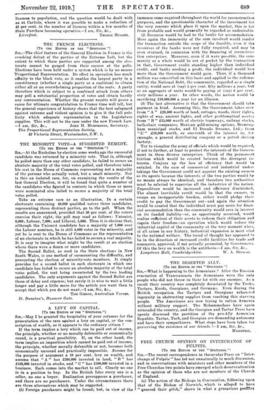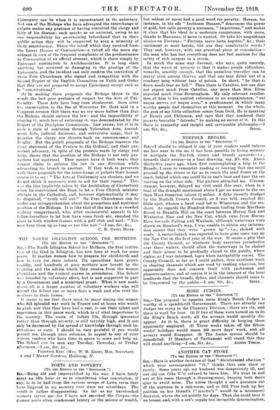FREE CHURCH OPINION ON INTERCHANGE OF PULPITS.
[To THE EDITOR OF THE " SPECTATOR."
SIR,—The recent correspondence in the secular Press on "Inter. change of Pulpits " has led not unnaturally to much discussion, and in conversations with ministers and other members of the Free Churches two points have emerged which deserve attention as the opinion of those who are not members of the Church of England.
(a) The action of the Bishops in Convocation, following upon that of the Bishop of Norwich, which is alleged to have " queered their pitch," shows in what a precarious mire/ Episcopacy can be when it is unrestrained in its autocracy. Not one of the Bishops who have advocated the interchange of pulpits makes any pretence of having consulted the clergy and laity of his diocese: each speaks as an autocrat, owing to no one responsibility for ascertaining beforehand that in their public action they will be supported by even a minority of their constituency. Hence the rebuff which they received from the Lower Houses of Convocation—a rebuff all the more significant in view of the frequent complaints of the predominance in Convocation of an official element, which is there simply by Episcopal nomination to Archdeaconries. It is long since anything has occurred so damaging to the prestige of the Episcopate, and the incident can only confirm the conviction of those Free Churchmen who signed and sympathize with the Second Report of the English Committee on Faith and Order that they are not prepared to accept Episcopacy except such as is " constitutional.'
(b) In making these proposals the Bishops threw to the winds the last poor pretence of respect for the Acts of Uniformity. Those Acts have long been obsolescent. Soon after his consecration to the See of Worcester Dr. Gore said in a Congress sermon that there was no cry more hollow than that the Bishops should enforce the law : and the impossibility of obeying it, much less of enforcing it, was demonstrated by the Report of the Discipline Commission. Law exists; but it is in such a state of confusion through Toleration Acts, Amendment Acts, judicial decisions, and subversive usage, that in practice the clergy are thrown back on common-sense and loyalty. But the pulpit proposals of the Bishops traverse the clear statement of the Preface to the Ordinal, and their persistent advocacy, in spite of the protests made by clergy and laity, shows that the position of the Bishops is not only precarious but equivocal. They cannot have it both ways; they cannot claim to enforce the law in one direction while advocating its breach in another. If they wish to persevere with their proposals for the interchange of pulpits their honest course is to say : " The Acts of Uniformity are obsolete, and we do not think it necessary even to ask for their repeal." This a as the line implicitly taken by the Archbishop of Canterbury when he constrained the Dean to let a Free Church minister officiate in the Cathedral, and, however diplomatically it may bo disguised, " truth will out." No Free Churchman can be coder any misapprehension about the precarious and equivocal position of the Bishops. It is like that of the man in a crowded railway compartment, who, after unsuccessful appeals to his fellow-travellers to let him have some fresh air, smashed the glass in both window-frames with a golf club and said: " You may keep them up as long as you like now."—I am, Sir, &c., C. R. DAVEY BIGGS.







































 Previous page
Previous page